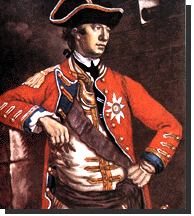Related Topics
The British Attack Philadelphia
Fighting in the Revolutionary War lasted eight years; for two years (June 1776 to June 1778) Philadelphia was the main military objective of the British.
Revolutionary Philadelphia's Loyalists
History is written by the victors, so the Tory Loyalists of Revolutionary Philadelphia have mostly fallen from view.
City of Rivers and Rivulets
Philadelphia has always been defined by the waters that surround it.
Pacifist Pennsylvania, Invaded Many Times
Pennsylvania was founded as a pacifist utopia, and currently regards itself as protected by vast oceans. But Pennsylvania has been seriously invaded at least six times.
Favorites - II
More favorites. Under construction.
Meschianza

|
| General Howe |
The British under General Howe occupied Philadelphia for a little more than six months, withdrawing at the end of May 1778. Washington and his starving troops were shivering in the miserable encampment at Valley Forge that winter, and it is easy to imagine the British encircling, besieging or storming the encampment to put an end to the war then and there. Instead, Howe settled down in the enemy capital and had a merry time of it. Historians differ about the reasons for this puzzling behavior. On the one hand, Howe never did any campaigning in the winter if he could help it, somehow feeling that gentlemen soldiers had a right to revel, just as school children now feel they have a right to loaf in the summer. Perhaps there were practical military reasons to avoid winter campaigns, as well. However, it is also true that Howe had shown whig sympathies in the past, and very likely did feel that conciliation with the colonists was not only a possible but the best possible outcome of the dispute. If that was his idea, he was listening too much to the rich Tories in Philadelphia and not enough to the scowling artisan class, or to the solemn-faced Quakers. All winter long, the British soldiers revealed in theatricals and parties, apparently oblivious to the starvation nearby, or the appalled reactions of the sober Quakers to music, dancing, and ornamental dress. If Howe had any purpose to bedazzle the populace, he could not have put a better man in charge than his Lieutenant-General Major John Andre, whose thumb-in-your-eye attitude was defiantly underlined by his taking up Benjamin Franklin's own house as his pied a Terre.
Andre certainly cut a fine figure. It would be hard to say whether John Burgoyne or John Andre was the most dashing man in England, but it was surely one or the other. They both wrote plays and poetry of professional quality, designed costumes and scenery, and organized one extravaganza after another. They were both handsome in the eyes of ladies, and fearless soldiers in the eyes of men. Anything you can do, I can do better.
About the time Howe was replaced by General Henry Clinton and recalled to England, the position in Philadelphia began to look dangerous for the British. The French signed an alliance with the American Revolutionists earlier that spring, and the concern became a real one that the French fleet might blockade the mouth of Delaware and trap the British Army, stranded a hundred miles upriver from its own Navy. When Andre learned they were leaving, he saw they needed to have a celebration that would be remembered.

|
| Benedict Arnold |
Even today, the day-and-night revelry is indeed remembered. Andre wrote a detailed description for his local girlfriend Peggy Chew (the daughter of Pennsylvania's Chief Justice) that is really something to read. Made all the more pointed with our present hindsight that Peggy Chew was the best friend of the Peggy Shippen who married Benedict Arnold, the letter gives the celebration a made-up name, Meschianza. Sometimes spelled Mischianza, the derivation is loosely connected to the Italian word for Medley. It began with a regatta of costumed soldiers and local ladies on barges sailing slowly down the river accompanied by cannon fire, singing, and music. The main events of the week took place on the South Philadelphia plantation of Joseph Wharton, now called 5th and Wharton Streets. Horsemen of the British Army put on a Medieval tournament with jousting and whatever, dressed in white and pink satin, and hats of pink silk with white feathers on the brim. There were fireworks at night and banquets. Good wine, toasts, and laughter to witty remarks. The final high point was a fancy dress ball. Wow.
And then, the British moved across the river to New Jersey, and were gone.
REFERENCES
| Treacherous Beauty: Peggy Shippen, the Woman behind Benedict Arnold's Plot to Betray America: Mark Jacob:978-0762773886 | Amazon |
Originally published: Monday, June 26, 2006; most-recently modified: Thursday, May 02, 2019
| Posted by: Karri Hickey | Mar 5, 2011 6:22 PM |
| Posted by: Ann Shafer | May 8, 2008 10:38 PM |
There's a book called A Touch of Magic that I read as a girl that includes the Meschianza. I always wanted to know more about what actually happened.
| Posted by: Eve Silberman | Dec 11, 2006 3:00 PM |